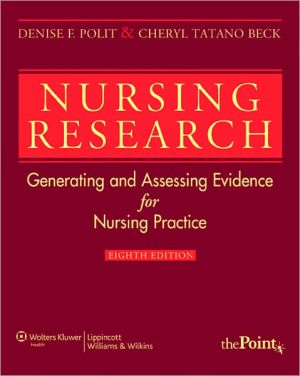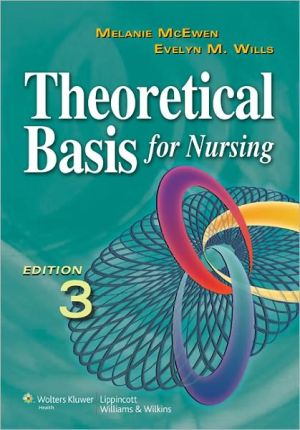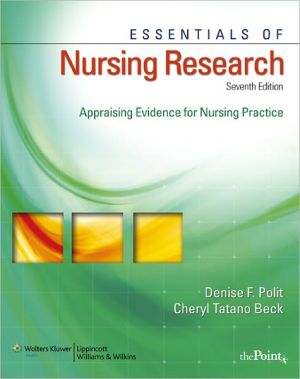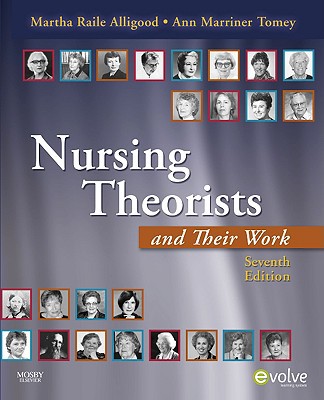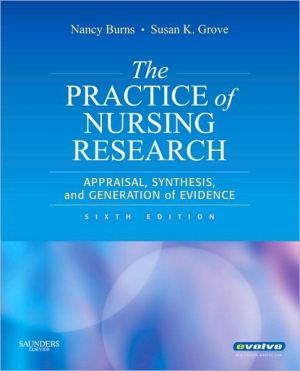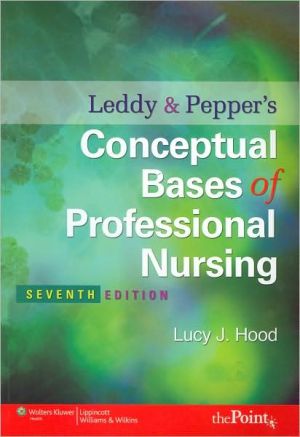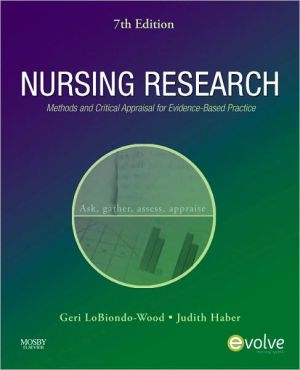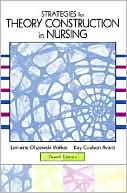Nursing Research: Generating and Assessing Evidence for Nursing Practice
Thoroughly updated and revised to emphasize the link between research and evidence-based practice, this Eighth Edition of a classic textbook presents state-of-the-art methods for conducting high-quality studies. New chapters offer guidance on developing self-report scales, conducting systematic reviews, and enhancing the integrity of qualitative studies. The ancillary Resource Manual includes application exercises, models of comprehensive research critiques, a full NINR grant application, and...
Search in google:
Thoroughly updated and revised to emphasize the link between research and evidence-based practice, this Eighth Edition of a classic textbook presents state-of-the-art methods for conducting high-quality studies. New chapters offer guidance on developing self-report scales, conducting systematic reviews, and enhancing the integrity of qualitative studies. The ancillary Resource Manual includes application exercises, models of comprehensive research critiques, a full NINR grant application, and a "must-have" Toolkit on a CD-ROM, containing a treasure-trove of exemplary research tools (e.g., consent forms, a demographic questionnaire, statistical table templates)--all in easily-adapted Word documents to meet individual research needs. A watershed edition!Student Resource Manual with Toolkit, ISBN: 978-0-7817-7052-1. Doody Review Services Reviewer:Diane M Tomasic, EdD, RN(Slippery Rock University )Description:This book provides the foundation for conducting research, focusing on research methodology and evidence-based practice. The eighth edition includes many revisions as well as a new title for this well known text.Purpose:It is designed primarily to help researchers develop the skills for conducting research. It also helps them refine the skills of reading, evaluating, and using nursing research. These objectives have been met.Audience:This book is best suited for graduate nursing programs where students are learning to do research and for those learning to appraise research evidence. The authors have a long history of research and writing research books.Features:There are many revisions to this classic. The new title denotes the importance of evidence-based practice and the evidence-based practice chapter has been moved up to the second chapter. Critiquing guidelines are included in every chapter rather than treated in a single chapter at the end. This edition now includes a balance of medical and social science techniques to allow nurses to become familiar with that terminology. The new organization of the chapters on methods focuses on the techniques rather than the use in a specific research approach. New chapters cover systematic reviews and development of self-report scales. While qualitative research information appears throughout chapters, there is a new chapter on enhancing and assessing the integrity of qualitative research. An important addition is the resource manual that focuses on critique opportunities. A toolkit on the accompanying CD-ROM includes numerous research resources that can be downloaded and used directly or adapted. The text contains the usual key features such as research examples, critiquing guidelines, specific tips on conducting research and student learning aides.Assessment:This book should be very useful to the target audience. The reorganization of the book with the emphasis on evidence-based practice, and the resource manual make it a must-have for the classroom.
Part I: FOUNDATIONS OF NURSING RESEARCH AND EVIDENCE-BASED PRACTICE 1: Introduction to Nursing Research in an Evidence-Based Practice Environment 2: Translating Research Evidence into Nursing Practice: Evidence-Based Nursing 3: Generating Evidence: Key Concepts and Steps in Qualitative and Quantitative ResearchPart II: CONCEPTUALIZING A STUDY TO GENERATE EVIDENCE FOR NURSING 4: Conceptualizing Research Problems, Research Questions, and Hypotheses 5: Finding and Critiquing Evidence: Research Literature Reviews 6: Developing a Theoretical or Conceptual Context 7: Generating Research Evidence EthicallyPart III: DESIGNING A STUDY TO GENERATE EVIDENCE FOR NURSING 8: Planning a Nursing Study 9: Developing an Approach for a Qualitative Study 10: Designing Quantitative Studies 11: Enhancing Rigor in Quantitative Research 12: Undertaking Research for Specific Purposes 13: Developing a Sampling PlanPart IV: COLLECTING RESEARCH DATA 14: Designing and Implementing a Data Collection Plan 15: Collecting Unstructured Data 16: Collecting Structured Data 17: Assessing Measurement Quality in Quantitative Studies 18: Developing and Testing Self-Report ScalesPart V: ANALYZING AND INTERPRETING RESEARCH DATA 19: Analyzing Qualitative Data 20: Enhancing Quality and Integrity in Qualitative Research 21: Describing Data through Statistics 22: Using Inferential Statistics to Test Hypotheses 23: Using Multivariate Statistics to Analyze Complex Relationships 24: Designing a Quantitative Analysis Strategy: From Data Collection to InterpretationPart VI: BUILDING AN EVIDENCE BASE FOR NURSING PRACTICE 25: Integrating Research Evidence: Meta-Analysis and Metasynthesis 26: Disseminating Evidence: Reporting Research Findings 27: Writing Proposals to Generate EvidenceMethodologic References Glossary
\ From The CriticsReviewer: Diane M Tomasic, EdD, RN(Slippery Rock University )\ Description: This book provides the foundation for conducting research, focusing on research methodology and evidence-based practice. The eighth edition includes many revisions as well as a new title for this well known text.\ Purpose: It is designed primarily to help researchers develop the skills for conducting research. It also helps them refine the skills of reading, evaluating, and using nursing research. These objectives have been met.\ Audience: This book is best suited for graduate nursing programs where students are learning to do research and for those learning to appraise research evidence. The authors have a long history of research and writing research books.\ Features: There are many revisions to this classic. The new title denotes the importance of evidence-based practice and the evidence-based practice chapter has been moved up to the second chapter. Critiquing guidelines are included in every chapter rather than treated in a single chapter at the end. This edition now includes a balance of medical and social science techniques to allow nurses to become familiar with that terminology. The new organization of the chapters on methods focuses on the techniques rather than the use in a specific research approach. New chapters cover systematic reviews and development of self-report scales. While qualitative research information appears throughout chapters, there is a new chapter on enhancing and assessing the integrity of qualitative research. An important addition is the resource manual that focuses on critique opportunities. A toolkit on the accompanying CD-ROM includes numerous research resources that can be downloaded and used directly or adapted. The text contains the usual key features such as research examples, critiquing guidelines, specific tips on conducting research and student learning aides.\ Assessment: This book should be very useful to the target audience. The reorganization of the book with the emphasis on evidence-based practice, and the resource manual make it a must-have for the classroom.\ \
